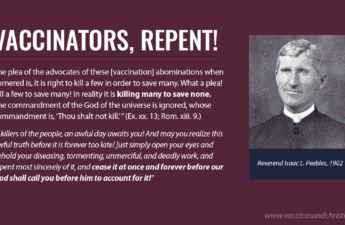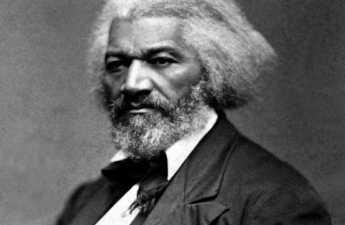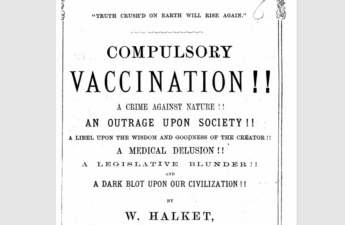
“Deliver those who are drawn toward death,
And hold back those stumbling to the slaughter.
If you say, “Surely we did not know this,”
Does not He who weighs the hearts consider it?
He who keeps your soul, does He not know it?
And will He not render to each man according to his deeds?”
Proverbs 24:11-12, NKJV
by Steve Halbrook
One of the pillars of vaccine propaganda is the lie that vaccines eradicated polio. Actually, the disease was conveniently redefined after the vaccine campaign commenced to make the vaccine look effective. We cover this, and the dangers of polio vaccination (both oral and inactivated) extensively here.
In America, the inactivated polio vaccine would be replaced by the oral polio vaccine, which in turn would be replaced by the inactivated vaccine (apparently, neither is safe). But while the oral polio vaccine was banned from use in the U.S. for being too dangerous, it was still used in other countries (where perhaps life is considered cheaper).
African nations are some of the countries that have suffered at the hands of the oral polio vaccine. Regarding Uganda in particular, one man, named Kihura Nkuba — recipient of the National Vaccine Information Center’s humanitarian award — has been instrumental in exposing the slaughter inflicted upon his fellow Africans by this vaccine.
As a radio broadcaster, he made use of his radio program to warn his people about the dangers of vaccines — despite persecution and even an attempt on his life. Driven into bankruptcy, Nkuba nevertheless retained his honor to save others.
In a 2002 talk for the National Vaccine Information Center (aired on C-SPAN), Nkuba says this about the slaughter inflicted on his countrymen by the polio vaccine:
So I was told by this preacher that when the government introduced the National Immunization Days in 1997, most of the children after vaccination started dying. The preacher told me that they had so much death that his cassock, that he wears to go and conduct the burial ceremony, got old. He said “I buried the children and my cassock got old.”
In the same room there was one mother who had four children, and she hid one and took three other children for vaccination, and three children died and that one survived. Now when I went to do my presentation and I asked most of the people who were there – about two, three thousand people – each person had the same story.[1]
The slaughter began way before 1997, however, as the polio vaccine program in Uganda began in 1963.[2] Nkuba says that the following happened in 1977:
At the main hospital in Mbarara during that month of 1977 more than 600 children had died following polio vaccination. 600 children! So even some of the timid medical practitioners who were initially afraid to come out, started coming out giving information and saying ‘Oh, we knew this oral polio vaccine was trouble because as soon as the child receives it, they get a temperature and their health goes downhill and there is nothing that you could do.’ So the mothers said they would not take their children for oral polio vaccination. [3]
According to Nkuba, polio wasn’t a problem in Uganda to begin with. That is, until polio vaccination began to spread it:
When I told him that really the polio (vaccine) they were using in Uganda was discontinued in America because it was the sole cause of polio. And according to the information I had, there was really no polio in Uganda. There had been no polio. I grew up to be twenty five. I didn’t see anybody with polio. I started seeing polio when I went to the cities where polio vaccination had taken place. …
[S]omebody brought me an insert that comes with the polio vaccine, and it was from Pasteur-Mer???? a French company that manufactures the polio vaccine, and that was the one that was used in 1997 when children started dying in large numbers. … In fact it says that if a child is inadvertently given the oral polio vaccine, that that child should be quarantined for four to seven weeks because oral polio vaccine is “live” and they keep shedding it between that period, and they could contaminate other people.[4]

Not only was the vaccine the source of polio, but Ugandans were given the vaccine despite being at extra risk due to Uganda’s widespread HIV problem:
And when I looked at the contra-indications [in the vaccine’s package insert] it stated that inactivated polio vaccine and not oral polio vaccine should be used in situations where families had HIV – where there was a history of HIV in the family. And when I got this information I was really shocked because since 1984 Uganda has had a very difficult HIV and AIDS problem. …
So I was saying here is the manufacturer who is writing for anybody who could read English that please do not give this oral polio vaccine to population that have HIV and here is the Ministry of Health which, in its own wisdom, says this has to be used here.[5]
Indeed, the CDC’s website itself gives the following warning about vaccinating those who are immunocompromised with the oral polio vaccine (OPV) — it is both dangerous and can result in spreading of the polio virus:
OPV should not be used to immunize immunocompromised patients, their household contacts, or nursing personnel in close contact with such patients … . Immunocompromised patients may be unable to limit replication of vaccine virus effectively, and administration of OPV to children with congenital immunodeficiency has resulted in severe, progressive neurologic involvement (29-32). …
If OPV is inadvertently administered to a household or intimate contact (regardless of prior immunization status) of an immunocompromised patient, close contact between the patient and the recipient of OPV should be avoided for approximately 1 month after vaccination, the period of maximum excretion of vaccine virus. Because of the possibility of immunodeficiency in other children born to a family in which there has been one such case, OPV should not be administered to a member of a household in which there is a history of inherited immunodeficiency until the immune status of the recipient and other children in the family is documented.[6]
But despite the warning by the OPV package insert and the CDC about vaccinating those with HIV with the oral polio vaccine — and Uganda’s widespread HIV epidemic — the population was nevertheless subjected to the oral polio vaccine. According to Nkuba:
I have to tell you HIV is very big in Uganda – very big in East Africa. I was born in a family of eleven, but from 1987 up to today I have lost eight members of my family through HIV.
So when the manufacturer says ‘Do not give this vaccine to families that have a history of HIV’ there are no families in Uganda that have no history of HIV. Everybody knows somebody who has died or has lost an uncle or a brother’s wife or his children through HIV. And it’s that relationship that people were able to put together saying ‘Maybe really the oral polio vaccine, when given to population that has HIV – when live vaccine is given to a population that has HIV, it produces that reaction.'[7]
Nkuba describes the plight of Ugandans and those in other African countries in trying to escape with their lives from the murderous forced vaccination programs:
[T]he minister of health, the World Health Organization and the UNICEF … mobilized the army, and the police and moved from house to house. They had asked the local authorities to do a list of people who had children, so they moved from house to house grabbing children at gunpoint and vaccinating them.
Now those that knew – as soon as the army got into the village – the rest of the people who had children would run into the bush, and they stayed there for a week. … Now the thing was -those that went for vaccination came immediately to report reactions, and a good many of them lost their children. Those that did not go for vaccination did not have the same reaction. …
The oral polio vaccine in Uganda, northern Tanzania, Rwanda, Burundi, Congo and part of Kenya has become a hotly contested debate. Thousands of people, during the National Immunization Days in the months of July and September, go into the bush and stay there for weeks. The army and the police move house to house looking for children to vaccinate. At the same time, things that kill children like malaria, cholera, issues of stunted growth, sanitation, are completely untackled.[8]
Uganda is an example of how vaccination has caused untold suffering to countless families. Imagine seeing your children being rounded up and forcefully given a deadly poison at the point of a gun, and then witnessing them dying in your arms soon afterwards.
Such terror and wickedness the Ugandans and other Africans have suffered again and again — all to appease that merciless idol of the medical religious cult, vaccination.
The act of rounding up people by gunpoint and forcing them to take a deadly poison appears to be nothing short of planned extermination — and not unique to Africa; for instance, we have seen a similar situation in Australia, as previously discussed.
May God crush the insanely genocidal vaccination programs around the world, and raise up rulers with justice and compassion.
Notes
_____________________________________
[1] Kihura Nkuba, “Polio vaccine genocide in Uganda” (A Transcript of a talk given by Kihura Nkuba at the National Vaccine Information Center’s Third International Public Conference on Vaccination November 7-9, 2002 – Arlington, Virginia, aired on C-Span 2 on November 7, 2002.) Retrieved March 12, 2019, from http://www.whale.to/a/nkuba.htm.
[2] Ibid.
[3] Ibid.
[4] Ibid.
[5] Ibid.
[6] Centers for Disease Control and Prevention. Recommendations of the Advisory Committee on Immunization Practices (ACIP): Use of vaccines and immune globulins in persons with altered immunocompetence. MMWR 1993;42(No. RR-4). Retrieved March 13, 2019, from https://www.cdc.gov/mmwr/Preview/Mmwrhtml/00023141.htm.
[7] Nkuba, “Polio vaccine genocide in Uganda.”
[8] Ibid.
Hear Kihura Nkuba discuss his battle to expose the polio vaccine genocide in Uganda
While a pro-vaccine propaganda video, this shows the resistance to the deadly polio vaccine in the African country of Kenya.
If you find this site helpful, please consider supporting our work.


